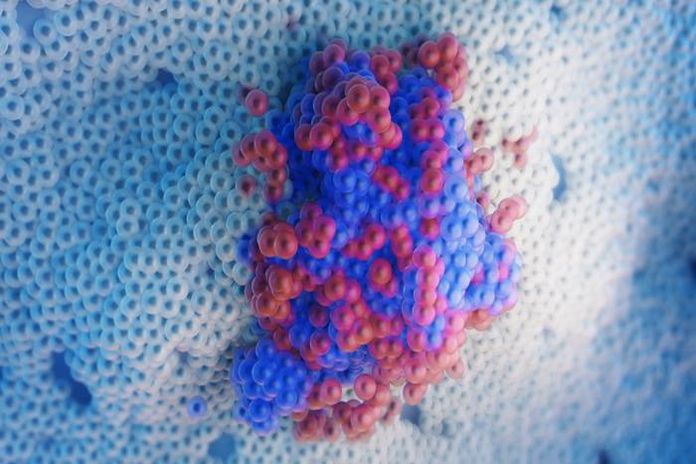- Borrowing principles from pest management, ASU researchers aim to extend survival rate, quality of life for cancer patients
Arizona State University
Just as crop-devouring insects evolve to resist pesticides, cancer cells can increase their lethality by developing resistance to treatment. In fact, most deaths from cancer are caused by the evolution of therapeutic resistance.
In a new review, Arizona State University researchers, working with colleagues around the world, explore how established agricultural pest management strategies could be adapted to address cancer therapy. The pioneering method opens new possibilities for controlling drug resistance and improving patient survival.
The research, which appears in the current issue of the journal Cancer Research, explores 10 pest management principles that could be adapted to treat cancer.
The approach represents a paradigm shift, with an emphasis on managing cancer as a chronic condition rather than seeking complete eradication in cases where curing the disease is unlikely. Clinicians are just beginning to apply these strategies, in a treatment called adaptive therapy.
Drawing from pest management opens a new avenue of cancer research and treatment for a disease that now kills nearly ten million people worldwide each year, according to the World Health Organization (WHO).
“We’ve been treating cancer as if it doesn’t evolve in response to what we do to it. It is time that we take that evolution seriously, guiding it rather than succumbing to it,” says Carlo Maley, co-corresponding author of the new study.
Maley is a researcher at the Biodesign Center for Biocomputing, Security and Society and professor with the School of Life Sciences at ASU. He is also the director of the Arizona Cancer Evolution Center. In addition to cancer researchers, the interdisciplinary team includes experts in pest management.
A history of drug resistance
In the 1940s, a central obstacle to effective cancer therapy was already evident to researchers. The cause was the evolution of treatment-resistant cells that could not be killed through existing cancer-fighting drugs. Some 40 years earlier, farmers faced an analogous situation with the development of pesticide-resistant insects, which, left unchallenged, could overwhelm crops.
Drug resistance, a major cause of cancer treatment failure, occurs when therapies inadvertently select for the survival of drug-resistant cancer cells – similar to how pesticides can lead to resistant pests.
When resistance is “selected,” cancer cells or insects with resistant traits to treatment or pesticides, respectively, survive and reproduce, while the others are eliminated. Over time, resistant insects or cancer cells dominate. These resistant populations then proliferate, making treatment less effective and more difficult to manage.
Agricultural techniques inspire improved cancer treatment
A suite of agricultural techniques called integrated pest management combines biological, chemical and mechanical controls to sustainably manage pests. Researchers hope to apply ten principles adapted from these techniques in revolutionizing cancer research and treatment.
The techniques include:
- Prevention first: Optimizing patient care and modifying the environment to create conditions that are less favorable for cancer cell growth.
- Continuous monitoring: Using advanced tools like liquid biopsies to track tumor progression and resistance markers in real time.
- Only treat when necessary: Identifying specific thresholds for treatment to minimize unnecessary drug use.
- Adaptive treatment: Rotating therapies and adjusting doses based on tumor response to maintain long-term control.
- Minimal impact: Selecting treatments with fewer side effects and lower toxicity.
- Nonchemical approaches: Incorporating methods such as surgery and immunotherapy to reduce reliance on toxic drugs.
- Dose optimization: Using the lowest effective drug doses to slow resistance evolution.
- Cross-resistance reduction: Avoiding repeated use of drugs with similar mechanisms of action.
- Long-term success metrics: Focusing on survival and quality of life rather than complete eradication of the disease.
- Forecasting outcomes: Using predictive models to anticipate tumor behavior and refine treatment plans.
The approach could help overcome treatment resistance that occurs with existing cancer therapies, whether they rely on a single drug or multiple.
The applicability of adaptive therapy to all forms of cancer offers a broad framework for advancing oncology. For example, colorectal cancer, which has multiple treatment options but poor outcomes in the late stages, is an ideal candidate for clinical trials of this approach.
To maximize the potential of the new approach, the researchers emphasize the importance of personalized medicine. Continuous genomic profiling and liquid biopsies during therapy, for example, are powerful tools for tailoring cancer treatments to individual patients. By analyzing changes in tumor mutations and monitoring cancer biomarkers in bodily fluids, these techniques can help oncologists know when to change tactics and slow the evolution of drug-resistant cells while minimizing toxic side effects.
Adaptive therapy in action
In an earlier study – one of the first of its kind – Maley, first author Sareh Seyedi and their colleagues applied adaptive therapy to a preclinical model of a stubbornly resistant form of breast cancer in mice.
Unlike standard cancer treatments that aim to eliminate as many cancer cells as possible using maximum tolerated doses, adaptive therapy uses lower or intermittent doses to keep tumor growth under control. The approach exploits competition between drug-sensitive and drug-resistant cancer cells to prolong survival and reduce treatment resistance.
The researchers found that by alternating or modulating the doses of two anti-cancer drugs, they could significantly improve survival times compared with traditional therapy. The method also used lower cumulative drug doses, reducing toxicity while achieving better outcomes.
The researchers envision a future where adaptive therapy becomes a cornerstone of cancer care. Ongoing preclinical studies aim to validate these principles, and clinical trials will follow to evaluate their effectiveness in patients with advanced cancers.
In addition to ASU colleagues, Maley is joined by national and global researchers from Mayo Clinic; University of Arizona; North Carolina State University; University of California Santa Barbara; The Institute of Cancer Research; The Royal Marsden Hospital; Research Casting International; Istanbul University; and University of Lausanne.





